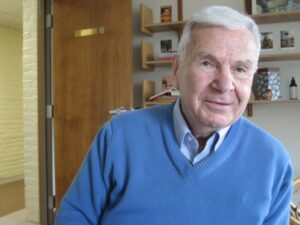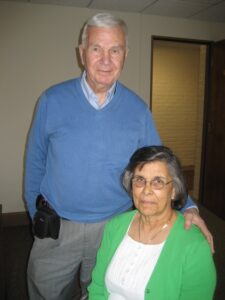With Rachel, his wife of 48 years, by his side, Dr. James Garber, M.D., a self-proclaimed “perpetual learner,” recounts his rich and constant academic history. "I just never really stopped going to school,” he admitted. Although he is classified as the class of 1997 (the year he completed the last course that was factored into his B.A.-degree requirements), Garber, who is 75, will walk in the University of St. Thomas’ commencement ceremony, May 22, at the Metrodome in downtown Minneapolis, because, he said, “It's good modeling for our five grandkids."

Dr. James Garber’s latest degree is an individualized major in "philosophy and classic civilizations."
All of his grandchildren, except his 1-year-old granddaughter in San Diego, Calif., will watch Garber accept his diploma.
Garber’s degree is an individualized major in "philosophy and classic civilizations." Dr. Michael Jordan, English Department, College of Arts and Sciences, worked with Garber to create a degree out of the philosophy, classics and history courses he earned at St. Thomas from 1953, when he was 18, to 1956, 108 credits total, and additional courses he had taken over the next 30 years at the University of Minnesota, Winona State University and Rochester Community and Technical College.
Jordan remembers the letter he received from Garber last year, asking for guidance in earning his B.A. He sensed how not having this degree left Garber with “a sense of something incomplete" in his life, and felt compelled to help him.
After confirming Garber's St. Thomas credits, which included all his core requirements, Jordan discovered that with the additional courses he had taken at other universities and colleges, Garber had "more than enough for a degree." But because philosophy and classic civilizations is not an official major field at St. Thomas, Jordan had to seek approval from the Committee on Studies, which unequivocally granted the request.
Although he didn’t fulfill his requirements to earn a bachelor’s degree at St. Thomas in 1956, Garber explains that "back in those days, students needed only three years of pre-med to be admitted into medical school. It had more to do with your G.P.A. than credits." So with a strong academic profile, Garber entered the University of Minnesota medical school, earning a B.S. in 1958, and his M.D. in 1960.

Dr. James Garber, with his wife, Rachel.
From there, he served as a medical officer in the U.S. Navy, which whisked him off to Long Beach, Calif., for three years. During that time, he interned at a hospital in nearby Torrence, Calif., where he met and fell in love with Rachel, a registered nurse. They married five months later in March 1962.
As hard working a student as Garber was, Rachel said the first thing she noticed when meeting her future husband was his hands. “I thought, ‘Those soft hands have never done a real day’s work in his life,’” she said, rolling her eyes.
But she also recalled how he proved her wrong time and time again. “He aced all his classes” at Winona State (where they both received their master’s degrees in counseling), she said. It shouldn't come as a surprise, then, that the highest grade Garber ever earned was an “A++++,” Rachel remembered, shaking her head. “The professor wanted to give him more plusses,” but thought five plusses might seem ridiculous, so he settled on four. In fact, he earned this unheard of grade in a class he shared with his wife. “That really ticked her off,” Garber said, chuckling.
Indeed, Garber’s pampered hands belied his work ethic. With a guileless shrug, he recalls, “I went back to school in the ’70s and just continued to accumulate degrees.” By 2007, he had earned two master of science degrees, one in counseling from Winona State University (1987), the other in astronomy from the University of Western Sydney (2003), where he wrote his thesis on "Astronomical Foundations of Medieval Medicine,” and a Ph.D. in humanities from Columbia Commonwealth University (2007).
In the “meantime,” he fulfilled a four-year residency at the Mayo Clinic in Rochester, Minn., and practiced internal medicine at the Olmsted Medical Center, also in Rochester, where he worked for nearly 40 years. He also worked part time at Guest House, an addiction recovery center for Catholic clergy and others working in religious professions.
Rachel noted, “One of my husband’s priorities was always education … . Our kids just knew they would go to college. Whether they’d go was never a question.” True to form, all of Garbers’ five children – three daughters and two sons – have advanced degrees or are working toward one, and one of their daughters is in medical school.
These days, in addition to working part time as medical director of Rochester Metro Treatment, where he helps opiate addicts get back on their feet, Garber's “semi-retirement" is sprinkled with a few other pursuits: completing his seventh degree – a master's in theology, translating a book on Hippocrates and 17th-century doctor Sir Thomas Burnet from Latin (in which he is self-taught) to English and writing his own book, tentatively titled, Problem Gods: Deism, In Search of a Meaningful Deity.
When asked what remains on his "bucket list," Garber skirts the question, not evading it, but not quite encouraging it. For him, it would seem, his life as a work in progress is the finished work – and Garber is a man with limitless energy and an immeasurable curiosity for all the world has to offer.






